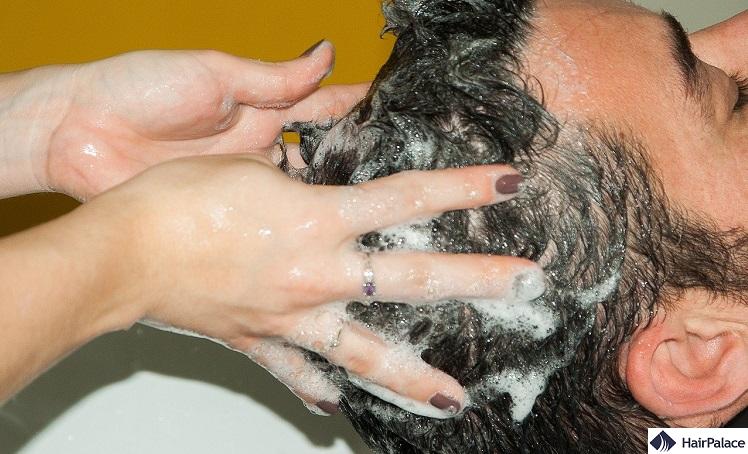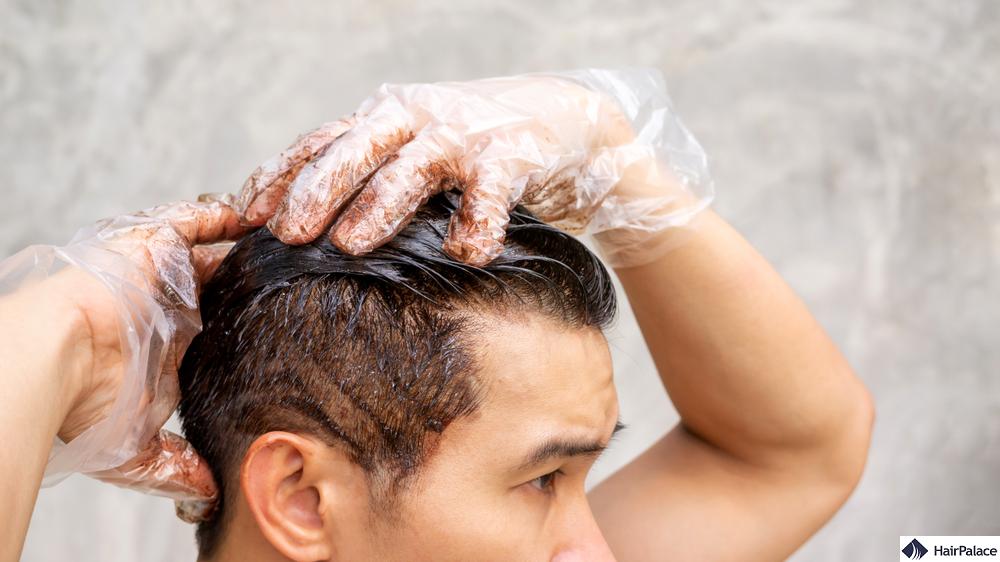Hair Growth: 8 Pro Tips to Grow Your Hair Faster

Ever wondered how quickly your hair grows?
The American Academy of Dermatology (AAD) found that the average person’s hair grows around 1/2 inch each month, equating to around 6 inches per year.
Factors influencing hair growth include genetics, hormonal changes, nutrition, and overall health.
Maintaining a balanced diet rich in essential vitamins and minerals, managing stress, and proper scalp care are crucial for promoting ideal hair growth.
But what if you want to grow longer hair but feel frustrated at the time it takes to reach your ideal length?
In this post, we’ll look at 8 tips on how to grow hair faster, covering nutrition, possible treatments, and more about men’s hair growth.
- How does hair grow?
- Nutrition
- Protein intake
- Essential oils
- Caffeine-based products
- Scalp massage
- Turn the heat down
- Cut back on hair dyes
- Treatments
Hair growth explained
According to the AAD, humans are born with around 5 million hair follicles.
They’re the only ones you’ll have for the rest of your life, and around 100,000 of them form on the scalp.
Hair strands grow at the bottom of follicles within the skin and develop from a root.
Blood circulates through the scalp, feeding nutrients and oxygen to those roots.
This steady supply keeps your hair healthy and encourages growth, though you lose between 50 and 100 hairs each day without realising it.
However, several conditions and life events can lead to increased hair loss.
Androgenetic alopecia (pattern baldness), extreme physical or emotional trauma, or medications may slow and prevent hair growth over time.
How to grow hair faster (natural hair growth tips)
There’s no quick fix for slow hair growth, but you can try several techniques to help your hair grow faster.
Eat a healthy, nutritious diet
Nutrition is crucial to maintaining strong, healthy hair that grows according to the natural cycle.
But if you go on a drastic diet that involves cutting a significant number of calories each day or avoiding specific foods, you could starve your hair of the fuel it needs to grow properly.
The body is an amazing machine. It can prioritise one function over another to help you stay as healthy as possible.
That means it will direct nutrients to fuel vital bodily functions before hair growth, and you may notice you start to lose more hair than usual.
You should be able to achieve normal growth once you return to a more balanced diet, but the thinning on your scalp could continue for months until it resumes.
If you want to lose weight in a safe, healthy way, speak to your doctor.
They’ll help you adjust your eating habits without sacrificing the nutrition your body needs.

Make sure you get the right amount of protein, hair growth vitamins, and minerals
Protein is a critical nutrient, especially when you want to boost growth.
Your body relies on proteins to create strong tissue cells, including those in your hair.
Healthy strands need a frequent supply of hair growth protein to develop correctly and at their usual rate.
But if you have a protein deficiency, your hair growth will be impeded, and you may start to experience thinning on your scalp.
High-protein foods include:
- Cheese
- Eggs
- Beans
- Lean meats
- Soya
- Nuts
- Seeds
Vitamins for hair growth are also important. Try to increase your intake of the following:
- Vitamin C
- Vitamin D
- Vitamin E
- Biotin (B vitamins)
- Iron
- Zinc
Zinc, for example, metabolises nutrients and repairs tissue, and research has suggested that it could play a part in hair loss.
But you need to consume it regularly because the human body doesn’t store zinc naturally.
Omega-3 and -6 may be effective in cultivating better hair growth, with more than 85% of test participants reporting improvements in hair diameter and density after six months.
Biotin hair growth supplements can also provide relief and strengthen hair strands.
Experiment with essential oils for hair growth
Hair growth oils can be really helpful.
Pumpkin seed oil has been shown to stimulate faster growth in male test subjects, leading to a 40% rise in the number of hairs on their scalp in six months.
Another study found that rosemary hair oil for growth can also be effective, and may work as well as minoxidil (a topical agent applied directly to the scalp).

Give your hair a boost with caffeine-based products
Caffeine may help you feel more awake in the mornings and alert during that post-lunch slump, but it can also contribute to healthy hair growth.
The research found that caffeine could encourage the growth of new hair at multiple levels. It increased both the length of the anagen stage and the hair strands.
You may try a caffeine-based shampoo or hair growth serum.
However, the Advertising Standards Authority (ASA) banned Alpecin shampoo from claiming that its products could reduce hair loss in 2018.
The ASA argued that the company lacked adequate evidence to support its claims. So, caffeine may help but it’s far from a guaranteed solution.

Increase circulation with regular scalp massages
A scalp massage can help you relax, clear your mind, and possibly increase hair growth along with the health of your hair.
One team discovered that several men involved in a study had thicker hair after six months of daily head massage for hair growth.
It’s believed that the stimulation encouraged blood vessels under the skin to widen, leading to thicker, stronger hair.
Brief massages each day may help combat stress and encourage you to feel calmer over time.
That may also reduce your risk of stress-related hair loss.
Reduce your heat styling
Straighteners, curling tongs, and other heat-based styling tools can make hair look terrific, but they may leave it dry and brittle too.
This can make hair more prone to breakage.
You might be unable to eliminate heat-based tools from your grooming routine entirely, but your hair could become healthier if you cut back on them.
Reduce the temperature whenever possible, and apply a heat protectant to your hair before you use a styling tool.
These place a barrier between strands and the hot implement, decreasing potential moisture loss.
Speak to your hairstylist about alternatives to heated styling tools and other hair growth tips to achieve the look you want.
Cut back on dyeing your hair
If you love to experiment with hair dyes and colour your hair frequently, you could be damaging your hair more than you realize.
Hair dyes, especially permanent ones, often contain harsh chemicals that can irritate the skin on your scalp. This could lead to redness, flaking, or scaling.
Additionally, repeated exposure to these chemicals may strip protective barriers from the hair strands and leave them more vulnerable to damage.
They could become weaker and prone to breakage.
If you want your hair to grow faster and look healthier, it may be worth cutting back on dyeing your hair to see if you notice an improvement.

Speak to a hair growth clinic about hair loss treatment
If you believe you may be losing your hair and want to prevent further shedding or restore growth, various hair loss treatments are available.
You can choose from home remedies for hair growth, medications or surgery depending on your goals.
Minoxidil and finasteride are two of the most common medications.
Minoxidil is a topical hair growth product applied to the scalp, designed to stimulate growth.
This takes a few months to generate results and must be used regularly to maintain any growth that occurs.
Finasteride is an oral medication that blocks the production of the DHT hormone.
In high levels, DHT can shrink follicles and disrupt the hair growth cycle.
However, hair transplant surgery is the most effective way to restore hair in thinning or balding areas.
It’s important to discuss this with a specialist, though, to identify potential reasons for your slow hair growth.
They’ll examine your hair and scalp, and discuss your medical history, to determine whether there’s a deeper issue that needs to be addressed.
This can ensure you’re a suitable candidate for a hair transplant, and that you enjoy effective results.
FAQ
Here are eight ideas to help you grow stronger hair in less time:
● Say no to restrictive diets.
● Treat yourself to a rejuvenating scalp massage.
● Experiment with essential oils.
● Increase your protein consumption (if necessary).
● Improve your nutrient profile.
● Apply caffeine-based products to hair (e.g. shampoo).
● Investigate platelet-rich plasma (PRP) procedures.
● Cut back on heat-based styling tools.
The following foods are helpful for strong, healthy hair:
● Eggs: Eggs have high biotin and protein levels, both of which are beneficial.
● Fish: Fish is rich in omega-3 fatty acids, protein, and selenium.
● Spinach: Spinach is high in vitamins A and C, iron, and folate.
● Avocados: Avocados are a good source of vitamins E and C, and fatty acids.
● Seeds: Seeds are great for B vitamins, omega-3 fatty acids, and zinc.
● Berries: Berries are packed with vitamins and compounds believed to stimulate hair growth.
● Nuts: Nuts contain fatty acids, zinc, and vitamin E.
● Sweet potatoes: Sweet potatoes are a rich source of vitamins A and C.
● Beans: Beans contain plenty of zinc, iron, folate, and biotin.
Try the following tips to boost your hair growth:
● Scalp massage: Can help to stimulate the scalp and improve blood flow, allowing essential nutrients and oxygen to reach hair follicles.
● Coconut oil: The fatty acids in coconut oil can help decrease the amount of protein lost from hair.
● Ginseng: Ginseng supplements may stimulate follicles.
● Geranium oil: Oil from this fragrant plant can improve circulation.
● Viviscal: This supplement contains AminoMar C, which may promote hair growth.
Hair grows from the root in the base of a follicle, which is fueled by blood channeled through vessels in the scalp. This leads to increased cell development and growth. Hair shafts penetrate the skin as they continue to grow, and pass an oil gland on their way out.
A balanced diet rich in proteins, vitamins (especially A, C, and E), minerals like iron and zinc, regular scalp massages to improve blood circulation, adequate hydration, and avoiding harsh hair treatments can help.
Regularly massage your scalp to improve blood circulation, use essential oils like rosemary or peppermint, maintain a balanced diet rich in proteins and vitamins, reduce stress through relaxation techniques, and avoid harsh hair treatments or styling products.
Look for shampoos with ingredients like biotin, caffeine, keratin, castor oil, peppermint oil, saw palmetto, and niacinamide. These promote hair growth, strengthen follicles, and improve scalp health.
For hair growth and thickness, a diet rich in protein, iron, biotin, and vitamins A, D, and E is essential. Topical treatments like minoxidil and scalp massages with oils (e.g., rosemary or castor oil) can also stimulate growth. Reducing stress and avoiding harsh hair treatments further supports healthy, thick hair.
Last medically reviewed on July 4th, 2025
- Rogers NE, Avram MR. “Medical treatments for male and female pattern hair loss.” J Am Acad Dermatol. 2008 Oct;59:547-66.
- Wall D, Meah N, Fagan N, York K, Sinclair R. Advances in hair growth. Fac Rev. 2022 Jan 12;11:1. doi: 10.12703/r/11-1. PMID: 35156098; PMCID: PMC8808739.https://www.ncbi.nlm.nih.gov/pmc/articles/PMC8808739/
- Trüeb RM. Effect of ultraviolet radiation, smoking and nutrition on hair. Curr Probl Dermatol. 2015;47:107-20. doi: 10.1159/000369411. Epub 2015 Feb 20. PMID: 26370649.https://pubmed.ncbi.nlm.nih.gov/26370649/
- Abelan US, de Oliveira AC, Cacoci ÉSP, Martins TEA, Giacon VM, Velasco MVR, Lima CRRC. Potential use of essential oils in cosmetic and dermatological hair products: A review. J Cosmet Dermatol. 2022 Apr;21(4):1407-1418. doi: 10.1111/jocd.14286. Epub 2021 Jun 23. PMID: 34129742.https://pubmed.ncbi.nlm.nih.gov/34129742/
- Koyama T, Kobayashi K, Hama T, Murakami K, Ogawa R. Standardized Scalp Massage Results in Increased Hair Thickness by Inducing Stretching Forces to Dermal Papilla Cells in the Subcutaneous Tissue. Eplasty. 2016 Jan 25;16:e8. PMID: 26904154; PMCID: PMC4740347.https://pubmed.ncbi.nlm.nih.gov/26904154/
- Peus D, Pittelkow MR. Growth factors in hair organ development and the hair growth cycle. Dermatol Clin. 1996 Oct;14(4):559-72. doi: 10.1016/s0733-8635(05)70384-3. PMID: 9238316.https://pubmed.ncbi.nlm.nih.gov/9238316/
- Park AM, Khan S, Rawnsley J. Hair Biology: Growth and Pigmentation. Facial Plast Surg Clin North Am. 2018 Nov;26(4):415-424. doi: 10.1016/j.fsc.2018.06.003. Epub 2018 Aug 16. PMID: 30213423.https://pubmed.ncbi.nlm.nih.gov/30213423/
- Parsley, William M; Perez-Meza, David1. Review of Factors Affecting the Growth and Survival of Follicular Grafts. Journal of Cutaneous and Aesthetic Surgery 3(2):p 69-75, May–Aug 2010. | DOI: 10.4103/0974-2077.69014https://journals.lww.com/jcas/Fulltext/2010/03020/Review_of_Factors_Affecting_the_Growth_and.2.aspx


